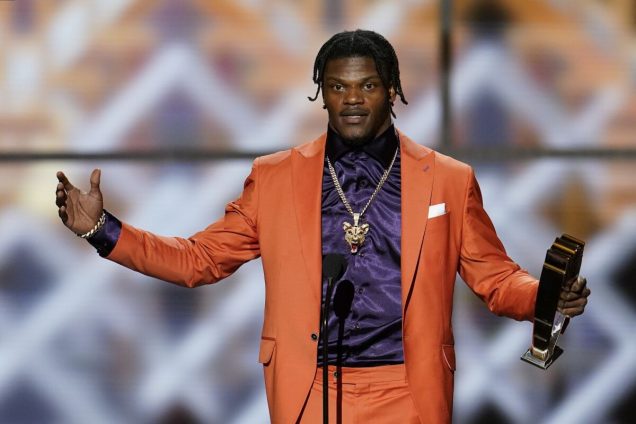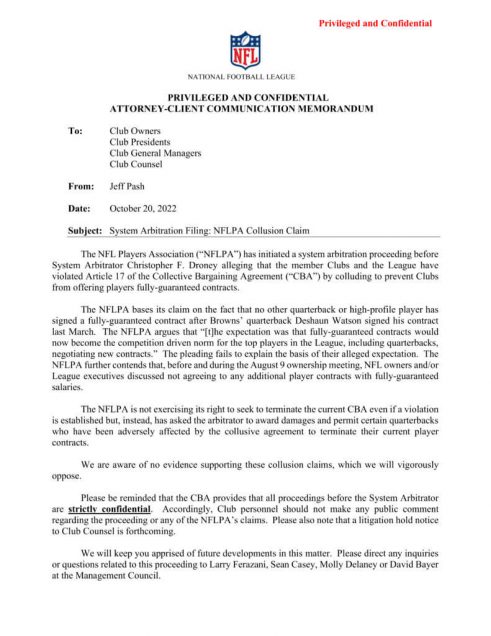The Two-Minute Drill: Frustration, Non-exclusion and Collusion – the story of Lamar Jackson’s contract
By Brendan Nordstrom
Just over a year ago, on March 11, Texans quarterback Deshaun Watson was not charged with sexual misconduct by the grand jury of Harris County. It was the first of two grand juries to not charge the former first-round pick. 24 women filed a lawsuit against Watson for sexual misconduct during massage appointments, and at least 20 have settled. The NFL suspended Watson for 11 games in the 2022 season, fined him $5 million and required him to undergo evaluation and counseling.
Watson was to miss over half of a season. Watson hadn’t played in over a year. Watson’s actions were “predatory,” NFL Commissioner Roger Godell said. Even if morality is out the window, Watson still comes with a tsunami of bad publicity. That didn’t stop the Cleveland Browns from not only trading three first-round picks for Watson but also offering him a fully guaranteed 5-year, $230 million contract, becoming the largest cap hit in NFL history – nearly 22% of Cleveland’s total budget.
Watson’s deal started an expensive precedent for star quarterbacks – or did it?
Representing himself, former MVP Lamar Jackson has been embattled with the Ravens and their general manager, Eric DeCosta, in contract negotiations for the past two seasons – all of which still haven’t been solved.

On March 7, the Ravens placed the non-exclusive franchise tag on Jackson in an effort to delay the negotiations further. However, the non-exclusive tag added an element to the table that wasn’t present before: other teams. Any team in the NFL is able to negotiate with Jackson, and if they offer him a deal, the Ravens are able to match it. If they don’t match, the offering team will be forced to give up two first-round selections to Baltimore in order to sign Jackson.
Sure, two first-round selections and a contract that mirrors Watson’s is a steep, steep price to pay. However, the Browns, as well as at least 10 other teams, were willing to inquire about Watson. Yet, those same quarterback-desperate teams – Carolina and Atlanta come to mind – immediately reported they were uninterested in Jackson. I’m talking less than an hour after the announcement. Among other teams uninterested were the Raiders, Dolphins and Commanders.
As former Washington quarterback — and Jackson’s former teammate in Baltimore — Robert Griffin III put it: “Don’t smell right.”
How can these teams be interested and willing to give up so much for a quarterback in Watson who brings less skill and more baggage to the table? It’s not often a former unanimous MVP and arguably a top-five quarterback hits the open market. By refusing to even talk to Jackson, these teams are not only making a poor management decision, but they are also flashing their cards of something everyone already knows – collusion exists in the NFL.
Following the Watson deal, NBC Sports’ Peter King reported the contract “didn’t sit well with the league or 31 other owners.” Even Ravens owner Steve Bisciotti spoke out against it, saying “Damn, I wish they hadn’t guaranteed the whole contract.” The absurd contract threatened to reset the quarterback market, which owners are trying to defend against in the case of Jackson.
The NFL Players Association is reportedly monitoring the situation, but it will be near-impossible to prove. This situation comes nearly five months after the NFLPA sent a memo alleging a violation of Article 17 of the CBA, which states “no club … shall enter an agreement, expressed or implied, with the NFL or any other club.” The memo alleges that owners discussed not giving fully guaranteed contracts at their meeting on Aug. 9, but they have “no evidence supporting these collusion claims.” It came in response to quarterbacks, such as Derek Carr, Kyler Murray, Russell Wilson and, of course, Jackson, not receiving a deal matching that of Watson.

An anonymous NFL executive rebutted the memo to Kalyn Kahler of The Athletic: “The Browns are the only team willing to do that. Everyone else knew that it was a terrible contract.”
The story of Lamar Jackson starts before he even entered the league. Jackson is one of 17 players in the NFL without an agent, representing himself with counsel from his mother. This began in the pre-draft process because he didn’t want an agent taking a percentage of his rookie contract.
While the former Heisman winner out of Louisville had concerns about his turnovers and inaccuracy, his lack of outside representation allowed players with agents an advantage. He ultimately fell to No. 32 in the 2016 draft class – the fifth quarterback off the board.
In seven games started as a rookie, Jackson threw for over 1,200 yards and six touchdowns, while rushing for another 695 and five scores. This set up an excellent sophomore campaign.
Jackson’s specialty is his dual-threat abilities, which he flashed in his 2019 season, breaking the quarterback rushing record with 1,206 yards on the ground and seven touchdowns. On top of the ground game, Jackson threw for over 3,100 yards and 36 touchdowns, leading Baltimore to a 14-2 record. Jackson won the MVP award unanimously with 50 votes, joining Tom Brady as the only other player with that distinction.
Jackson’s 2020 and 2021 seasons maintained his valor, being appointed to the Pro Bowl in the latter season. The day after the 2020 season is when the contract timeline begins.
“I’m totally certain [a long-term contract is] going to happen,” head coach John Harbaugh said on Jan. 20, 2021, a phrase he would mirror to reporters throughout the next two seasons, surely believing himself less and less each time.
With Harbaugh and DeCosta guaranteeing a contract extension, the longer the two sides didn’t agree, the harder the negotiations became. In that offseason, Cowboys quarterback Dak Prescott earned a four-year, $160 million contract, and Bills’ Josh Allen was awarded a six-year, $258 million extension.
On April 30, the Ravens exercised their fifth-year option on Jackson, and on Oct. 30, Pro Football Talk reported “no progress” in the contract discussions. Six weeks later, Jackson was sidelined with a season-ending ankle injury.
When the 2021 offseason began, the situation heated up. The Watson deal occurred on March 18, and the Ravens announced they were willing to work on the schedule of Jackson, who still represents himself.
There were a million small punches that led to Jackson’s frustration over the next year. On the first day of the 2022 Draft, Jackson tweeted a simple “WTF” when it was announced the Ravens traded his favorite target Marquise “Hollywood” Brown to the Cardinals for a first-round pick. In late May, Jackson skipped Ravens OTAs for the first time in his career. In early July, he changed his Twitter header to “I NEED $,” but clarified it was not in relation to contract negotiations. Leaving the field from a win against the Buccaneers in October, Jackson autographed a sign from a fan that said, “Pay ‘Em Now.”
The problem with representing yourself in the NFL is the several hats you are forced to wear. The overlap between player and agent meant Jackson set the deadline for contract negotiations to Sept. 9, two days prior to the Baltimore season opener against the Jets. Stop reading if you’ve heard this before – the two sides did not see eye-to-eye.
Reports from The Washington Post said the two sides were only “tens of millions dollars apart,” with the issue coming in the guaranteed money. Despite progress seemingly being made, Jackson shut down talks during the season.
As free agency opens up and Jackson remains under the non-exclusive tag, the most likely scenario is staying in Baltimore at a discount for the 2023 season. The Ravens have until July 17 to ink a long-term deal, but the sides remain at an impasse. Jackson could sit out the 2023 season if he chooses, as well.
There are teams that haven’t explicitly discarded Jackson. The 49ers are at the peak of their Super Bowl window but don’t have a first-round pick this season, so they could execute a much more difficult sign-and-trade. With the Panthers trading up to the No. 1 pick, the Colts (pick No. 4) could feel the pressure to get their own franchise quarterback outside of the draft. The Lions, a team on the brink of their own window opening, have the capital to acquire Jackson to push the rebuild forward, but they seem dedicated to Jared Goff and building through the Draft.
Deshaun Watson had the key to open the floodgates to a brand-new quarterback market. In a story that could be far from over, Lamar Jackson has the opportunity to turn it and unleash a typhoon.
